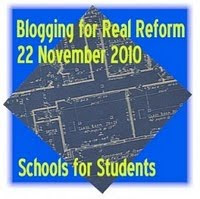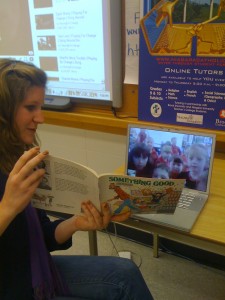 In September, my teaching assignment changed drastically – from teaching 12 year olds in a Grade Six Class (HWDSB) to teaching pre-service Teacher Candidates at Brock University, in Hamilton, Ontario. Although the curriculum, standards and focus changed – my intent stayed the same – to develop a program that provoked my students: to think critically, to engage in discussion, to see the potential of the Internet as a hub for collaboration, and to provide a platform for them to develop their own learning communities that are authentic, safe and supportive. I wanted them to see that learning can now take place anywhere, at anytime, and by anyone and that they have choice of how they want to learn, whether it be through video, music, text or images. I wanted them to realize that they have access to information, so long as they ask the questions. I wanted them to see the power that educators around the world have, so long as they stay active and participate in discussions about reform and change.
In September, my teaching assignment changed drastically – from teaching 12 year olds in a Grade Six Class (HWDSB) to teaching pre-service Teacher Candidates at Brock University, in Hamilton, Ontario. Although the curriculum, standards and focus changed – my intent stayed the same – to develop a program that provoked my students: to think critically, to engage in discussion, to see the potential of the Internet as a hub for collaboration, and to provide a platform for them to develop their own learning communities that are authentic, safe and supportive. I wanted them to see that learning can now take place anywhere, at anytime, and by anyone and that they have choice of how they want to learn, whether it be through video, music, text or images. I wanted them to realize that they have access to information, so long as they ask the questions. I wanted them to see the power that educators around the world have, so long as they stay active and participate in discussions about reform and change.
As a sixth grade teacher, I was used to teaching the same group of students for an entire school year. I had time to develop relationships and trust. I had time to get to know their needs. But in my current role, I have ten weeks and I ask, can a ten week course have the kind of impact that I set forth for these Teacher Candidates? I want to say yes, but time will tell. One thing I know for sure is that I can’t do it alone – no one can. At Brock, I never considered myself to be the “teacher”. But instead, a facilitator. In this 10 week course, the teachers were YOU. Maybe not you individually, but “you” as in my Learning Community. ‘You’ as in my twitterverse and blogosphere. ‘You’ as in my Skype colleagues and conference attendees. ‘You’ as my friends.
In particular, a few of YOU, volunteered YOUR time to share your passion and expertise with my Teacher Candidates.
Aviva Dunsiger (@grade1) – joined us to talk about her primary classroom and their role and expectations in the world of web2.0 and information. Her session led to deep conversations and thought about her students and what they will need in high school in just eight years from now. We talked about student blogging and parental concerns which led to questions such as, why do students even need to be connected at such a young age? How can we ensure students are being protected from cyberbullying? How do we really know this is good for students at all? Unfortunately, there is no recording for this event. Doug Peterson (@dougpete) joined us to talk about OSAPAC (Ontario Software Acquisition Program) Link to Recording. His presentation was geared specifically for these candidates, going into specialized programs and what programs/software will be available to them as they enter the field. Jen Deyenberg (@jdeyenberg) from Picturebutt, Alberta joined us to talk about practical considerations with Web 2.0 and Blogging- Link to Recording. She talked about her web2.0 endeavors as a junior/middle school teacher and her connections to teachers and students across the world. Jen talked about Cybersafety and her approach to safe internet use and student moderation. Rodd Lucier (@thecleversheep) Joined us to talk about his expertise with Creative Commons in education, Link to Recording. Rodd shared with us strategies for collaboration and authentic learning platforms and tools as it relates to Secondary Schools and teacher learning.
Like my 12 year olds, I wanted my adult students to become involved global citizens. I wanted them to know what if feels like to get your first comment on a blog post, or to have a discussion with a teacher or another student, from across the world. I wanted them to see that their actions will have impact that reaches further than their confines of their classroom walls. I wanted them to know what students from primary to high school classes across our world are already experiencing: A global education.
I developed the course assignments to do just that. First, the teacher candidates developed their own blogs as they platform for responding and reflecting on the other assignments (and to begin the journey of sharing) I included links to these in the sidebar of this blog.
The Teacher Candidates had to choose one web-blog community to follow and contribute to the posts, comments and discussions. They were encouraged to ask questions and seek clarification from the authors (and other contributors) and use an RSS feed to track the blog. I thank those of you who participated, knowingly or not. You made a difference.
http://thecleversheep.blogspot.com
http://larryferlazzo.edublogs.org/
http://tomwhitby.wordpress.com
http://virtualspacetheory.com/series/basic-approaches-of-the-vst/
http://coolcatteacher.blogspot.com
http://halfanhour.blogspot.com/
http://dangerouslyirrelevant.org/
http://spicylearning.wordpress.com/2010/11/20/dont-be-boring/
 Teacher Candidates were also required to participate in a LIVE AND INTERACTIVE SESSION and to provide a one page (blog) synopsis (Example – http://pipedreams-education.ca/2010/08/18/teaching-not-a-profession/) of the discussion as well as links and resources obtained and they were encouraged to find session times and topicsat Cassroom 2.0 LIVE (http://live.classroom20.com/calendar.html). These pre-service teachers discovered that teachers everywhere are banding together to talk about current and relevant issues in education. Their resulting posts include, Safia’s reflection on “Professional Development from the Comfort of your own home”; Candida’s post called: My footprint from the Netgen ; Krista’s “Just another art Class” ; Jackie’s post called “Learning from the Students” ; Melissa’s post called, “The Relevancy of Education”; Emma’s post about, “Elevating the Reform Dialogue” ; Dan’s post about, “procrastination-and-facebooking”; Kelsey’s post about, “I’m so networked I feel net-overworked”; Jordan’s post, “Learning while teaching”; Rob’s reflection on an Elluminate session called “Harnessing the power cells in Education” ;Chanthorns views on blogging; Alisha’s post about Flikr; Rosie’s post called, “Education for a good life” and Alisha’s post called, “In a blink of an eye”
Teacher Candidates were also required to participate in a LIVE AND INTERACTIVE SESSION and to provide a one page (blog) synopsis (Example – http://pipedreams-education.ca/2010/08/18/teaching-not-a-profession/) of the discussion as well as links and resources obtained and they were encouraged to find session times and topicsat Cassroom 2.0 LIVE (http://live.classroom20.com/calendar.html). These pre-service teachers discovered that teachers everywhere are banding together to talk about current and relevant issues in education. Their resulting posts include, Safia’s reflection on “Professional Development from the Comfort of your own home”; Candida’s post called: My footprint from the Netgen ; Krista’s “Just another art Class” ; Jackie’s post called “Learning from the Students” ; Melissa’s post called, “The Relevancy of Education”; Emma’s post about, “Elevating the Reform Dialogue” ; Dan’s post about, “procrastination-and-facebooking”; Kelsey’s post about, “I’m so networked I feel net-overworked”; Jordan’s post, “Learning while teaching”; Rob’s reflection on an Elluminate session called “Harnessing the power cells in Education” ;Chanthorns views on blogging; Alisha’s post about Flikr; Rosie’s post called, “Education for a good life” and Alisha’s post called, “In a blink of an eye”
To answer my earlier question, can a ten week course impact my students, so that they will become Global Educators, to think critically and to be active citizens? We’re in week 7 and I think they already have – Not because of me, and this course, but because of the community of educators that share and support one another everyday. Thank You PLN!
“As a future educator it is vital to acknowledge how societal changes permeate the walls of schools. It comes as no surprise that technology has become a cornerstone of a student’s life. Since we as educators must strive to create meaningful and authentic learning experiences for our students, it makes perfect sense to bring technology into the classrooms! Last year I attended an educational workshop at Brock University called “Getting Equipped To Use Free Web 2.0 Tools: Bridging The Learning Gap”. I remember being fascinated by the presenter, a former head of Science in the Hamilton-Wentworth District School Board, and his passion for electronic gadgets. In a period of just 3 hours I was introduced to a few of the amazing ways to creatively use Ipods and cellphones to enhance the curriculum. However as with all forms of learning, that was just the tip of the iceberg. Half the battle is learning how to use the technology, and the other half is learning how to use it in a way that engages students”. Source: http://safgilani.edublogs.org/2010/09/08/half-of-teaching-is-learning/
